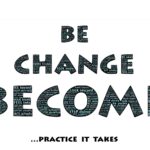When we reach the end of our lives, what do we wish to see? Maximizing impact starts with finding our true north and making corrections along the way.
Injustice can galvanize us and help others to avoid a similar fate. Former targets may reframe themselves as resistance leaders (Tracy, Lutgen-Sandvik, & Alberts), who rectify past abuse (Andone, 2017; Lewis, 2018). “. . . a powerful purpose can come from powerful pain” (Davis, 2017). In “How to Finally Find Your Purpose” Akbari (2019) suggests that we can transmute suffering into ways to contribute. Making the world a better place stems from experiences we do not wish to repeat.
A “purpose manifesto” directs behavior; e.g., “Do all the good you can, for all the people you can, in all the ways you can, as long as you can.” A purposeful life is a meaningful life, one where we can improve the life of at least one other person by helping, fixing, mending fences (even when it costs extra time and expense), volunteering, mentoring, engaging in self-development, thinking the best of others (and assuming positive intent), considering what we could have done better, asking for feedback, controlling ourselves, refraining from engaging in one-down commentary, and making goal setting a way of life. “The relentless pursuit of perfection” is not only a slogan, it is a manifesto for people who wish to become the best version of themselves.
Sometimes we resist difficult change. When asking for tips, Davey (2024) suggests focusing on specifics–not a generic, “Do you have any feedback for me?” (which allows other people to define the criteria and pile on the negative), but something more pinpointed: “Can you provide some input on how I can be a better team player?” Mental preparation cushions unexpected answers because we have braced ourselves psychologically, and because providers feel like collaborators in our process of self-development (Davey, 2024).
In any situation, we can become less concerned with our own needs and more focused on those around us (Gilbert, 2016).
References
Akbari, A. (2019, March 21). How to finally find your purpose. Psychology Today. https://www.psychologytoday.com/us/blog/startup-your-life/201903/how-finally-find-your-purpose
Andone, D. (2017, November 11). A force for change: Coping with grief though activism and advocacy. CNN. https://www.cnn.com/2017/11/11/health/force-for-change-grief-coping/index.html
Coleman, J. (2022, January 11). Finding success starts with finding your purpose. Harvard Business Review. https://hbr.org/2022/01/finding-success-starts-with-finding-your-purpose
Davey, L. (2024, May 16). How to ask for the feedback you really need. Harvard Business Review. https://hbr.org/2024/05/how-to-ask-for-the-feedback-you-really-need
Gilbert, J. A. (2016, June 30). Excavate your personal plank [blog post, modified and adapted]. https://organizedforefficiency.com/excavate-your-personal-plank/
Lewis, R. (2018, November 17). Finding purpose in the face of tragedy and adversity. Psychology Today. https://www.psychologytoday.com/intl/blog/finding-purpose/201811/finding-purpose-in-the-face-tragedy-and-adversity
Tracy, S. J., Sandvik, P., & Alberts, J. K. (2006). Nightmares, demons, & slaves: Exploring the painful metaphors of workplace bullying. Management





Recent Comments